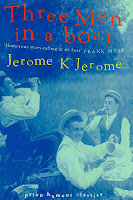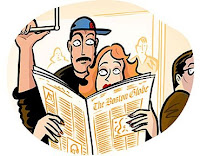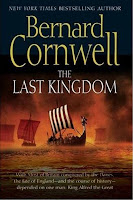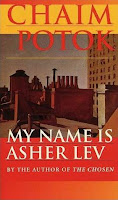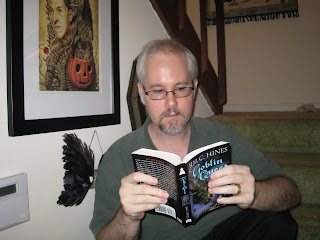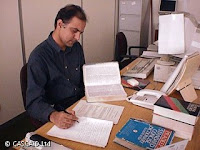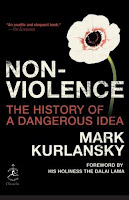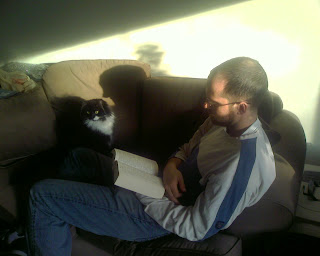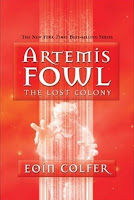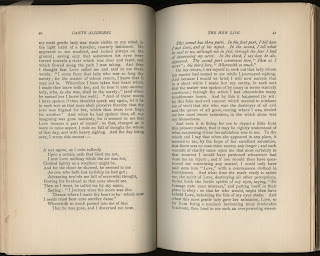
All over the (book) news this week has been the 75
th anniversary of that crazy book burning in
Berlin that should have warned people better that the Nazis were wankers of the most extreme kind.
In this big fire, books by authors such as Karl Marx, Sigmund Freud, and Thomas Mann, to name a very, very few were publicly burned, having already been banned. Burning books is, of course, quite clearly a deadly sin even if the Christians don't acknowledge it as such.
But what about those minor book crimes that occur every day, that are much more common than book burnings, and irritating rather than horrifying? Let's talk about the merely irksome class of book crimes.
1. Folding the pages instead of using a bookmark to keep your place
I realize this is a fairly minor offense, especially when compared against other things, but it drives me nuts. It just makes books look ratty and makes me think unpleasant thoughts about people who buy books in drug stores.
2. Writing in books
There are some circumstances under which this is acceptable and some circumstances under which it is heinous.
Acceptable: It's a textbook and the student using it isn't planning on reselling. Or, it's a textbook and the teacher/professor using it has the majority of their lecture notes in there.
Acceptable: You've just acquired a set of expensive books, preferably classics, that you know your sprogs will keep and treasure after they've sent you to the nursing home to be neglected.
Acceptable: You wrote the book and someone's asking you for your signature in a high-pitched, star struck voice and sweating profusely.
Heinous: You're not having kids and therefore no one wants your "heirlooms" with your damned chicken scrawl on the inside front cover.
Heinous: You have messy handwriting - if you're going to deface a book and then have it somehow end up in a stranger's hands, at least provide them with a good story or some deep thoughts they can decipher!
Heinous: You write over the printed text, making it illegible. Neck-punch-worthy!
Heinous: It is NEVER acceptable to write in a book you do not own, especially if it's from the library. Hisssss. If you must do this, because there is a worldwide shortage of post-it notes, write in pencil and then erase your notes before returning them to the library!
3. Borrowing books and not returning them
This is a tricky one, because if you're still in touch with the borrower, at what point is it clear that they definitely won't be returning the book(s) you lent them? I've become rather militant about this one but it makes me feel like a complete ass to be so. The thing is, I tend to lend out only my very favourite books because I'm so interested in having other people read them. A catch-22...but not Catch-22, that book sucks and you can keep it. Or at least the first 10 pages suck; that's as far as I could get with it.
4. Borrowing books and wrecking them
I have to admit that more often than not, I've been the perpetrator rather than the victim of this offense. Mea culpa. One person in particular, I wrecked her giant complete Chaucer in uni. I was a jerk and then years later I felt badly about it. I kept trying to meet her in person to offer her the money for a new one (in case she wanted to use that money for something else) but it never happened and now she's moved away. And the moment for reparations feels like it's passed (as in years ago passed). Le sigh.
5. Borrowing a book and not reading it
Isn't it obvious why this is wrong? It's like a asking for something to eat because you're starving then spitting the food out onto the face of the person who helped you, only less messy. But this contains the same problem as #3 - how long do you have to keep the book before it's clear you're not going to read it? I'm guilty of this one too. I'm going to need a hair shirt soon.
6. Abridging a book
This is the wayward publisher's biggest possible offense in the world. Cutting down The Tale of Genji or Great Expectations or some other massive but complete and perfect tome is to create a malformed monster one should be ashamed of. It's like having a baby with no head but which is still, inexplicably, alive. It frightens passersby and causes the devout to question their maker.
7. Stamps that can't be removed from the cover
When Oprah first began her reign of terror, Oprah's book club stickers were placed on the covers and could be removed. Later, when her evil plan for world book domination began to really take off, publishers decided to make those stickers part of the covers. This is unacceptable. Some of us are ashamed to find ourselves reading Oprah books and want to hide it - and this hiding shouldn't involve the use of dubious brown paper book covers because then people on the subway think we're reading either porn or cookbooks by Jamie Oliver.
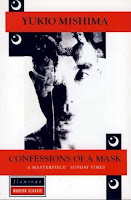 How can I say that Yukio Mishima was a genius of a perfect and unique kind, which never existed before and I doubt can exist again, without sounding either sentimental or sycophantic (if one can be a sycophant to the dead)?
How can I say that Yukio Mishima was a genius of a perfect and unique kind, which never existed before and I doubt can exist again, without sounding either sentimental or sycophantic (if one can be a sycophant to the dead)? In Confessions of a Mask, the narrator frequently mentions his "bad habit" of masturbating while thinking of men in some kind of physical pain (including St. Sebastian, who Mishima posed as in photographs) but more subtle and painful bad habits abound in this young man's emotions and behaviours. In particular, "the bad habit of regarding even a little happiness as a big favor, which we would have to repay" permeates his every action and makes both comfortable decision-making and cessation from self-dissection impossible (p. 146).
In Confessions of a Mask, the narrator frequently mentions his "bad habit" of masturbating while thinking of men in some kind of physical pain (including St. Sebastian, who Mishima posed as in photographs) but more subtle and painful bad habits abound in this young man's emotions and behaviours. In particular, "the bad habit of regarding even a little happiness as a big favor, which we would have to repay" permeates his every action and makes both comfortable decision-making and cessation from self-dissection impossible (p. 146).

